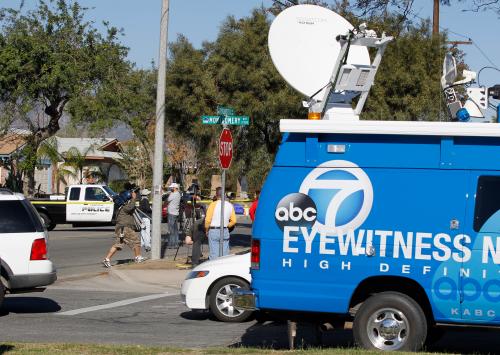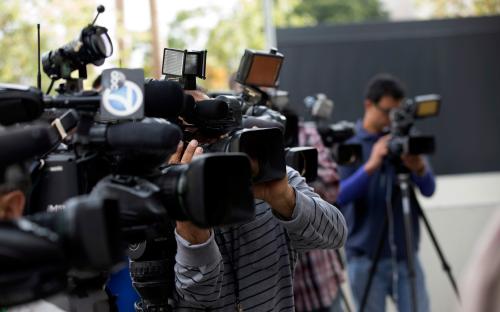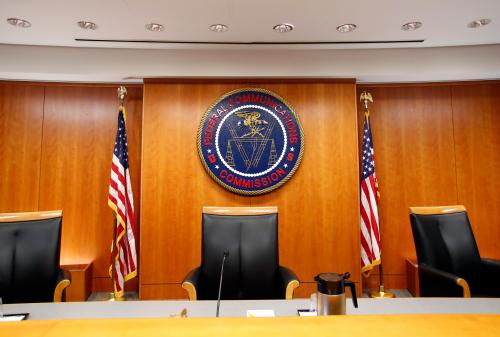Tom Wheeler served as the 31st Chairman of the Federal Communications Commission from 2013-2017.
It was fun to watch the viral video compilation of scores of supposedly “local” news reporters mouthing the same corporate-decreed script on the almost 200 local television stations owned or operated by Sinclair Broadcasting Corporation.
It was also tragic.
From the very beginning of television broadcasting, it has been a local medium. Licenses to the people’s airwaves were given away for free to companies that promised to use the power of television to deliver local news and information. The concept of such “localism” became the watchword of public policy. For instance, the government forced cable television systems to carry local broadcast stations in order to preserve the economic base of local news and information.
The ultimate effect of the Trump Federal Communications Commission’s (FCC) elimination of the historical protections for localism was illustrated by the viral video: local faces mouthing a non-local script. Amazingly, when the Chairman of the company that ordered reporters to read those identical “local” news pieces responded to a New York Times story, he reinforced how the company was walking away from the sacred concept of localism.
“You can’t be serious!” Sinclair Chairman David Smith emailed the Times. “Do you understand that as a practical matter every word that comes out of the mouths of network news people is scripted and approved by someone?”
Therein lies the truth of the matter: localism goes out the window in favor of national network-like messages. The comparison for Sinclair is not those television stations that emphasize local news, it is the national feed of the television networks. That the revelation should come from the chief beneficiary of the Trump FCC’s actions against localism is refreshingly candid.
Yes, network news is nationally scripted for a national audience. The New York-based networks such as ABC, CBS, Fox and NBC feed common fare to all their affiliates. That is precisely why broadcasting policy – until the Trump FCC – has expected those local affiliates to use the medium for local news and information. Sinclair’s broadcast licenses mandate the provision of local services, not a de facto new national network with pre-scripted national messages. By original design and follow-on intent, local broadcast stations are not supposed to be the same as television networks.
Over the last year-and-a-half, the Trump FCC has serially removed the policies that protected localism. Sinclair Broadcasting and its planned $3.9 billion acquisition of Tribune Media have been the consistent beneficiary of these rule changes. One-by-one, elimination of these rules has undermined localism in favor of a new national broadcasting powerhouse with unprecedented reach into almost three-quarters of American kitchens, dens and living rooms. By discounting some stations’ audience reach by half, the Trump FCC’s new math squeezed the transaction below Congress’ mandate that no company could own access to more than 39 percent of households.
The FCC then abolished rules that prevented the charade of managing a station, taking all its revenues, making all the hiring decisions, but claiming it was not technically owned by Sinclair. The rules that had long prohibited local media consolidation were similarly diluted. In the ultimate example of anti-localism, the FCC declared that licensees no longer even needed a local studio!
While Sinclair has long been a voice for conservative politics, not everyone agrees with its power grab. Christopher Ruddy, chief executive of Newsmax, a conservative digital news service, opposes the anti-localism of the Sinclair-Tribune transaction. “I want stations to do local programming and not be controlled by Washington or New York or Baltimore,” Ruddy told The Los Angeles Times. “I think that’s better for everyone, conservatives and liberals.”
One last chance remains for the Trump FCC to stand up for localism. The agency (along with the Department of Justice) must approve the Sinclair-Tribune transaction. At the Justice Department, such a decision hinges on the strict requirements of the antitrust statutes. The FCC the test is much broader: whether the transaction is in the “public interest.” It is hard to imagine that the consolidation of communications power to destroy the underlying localism of broadcasting is somehow in the public interest.
The Media Critic in Chief apparently has no trouble with Sinclair’s abrogation of its local public interest:
So funny to watch Fake News Networks, among the most dishonest groups of people I have ever dealt with, criticize Sinclair Broadcasting for being biased. Sinclair is far superior to CNN and even more Fake NBC, which is a total joke.
— Donald J. Trump (@realDonaldTrump) April 2, 2018
The Trump FCC has spent the last year-and-a-half preparing the way for the President’s favorite broadcaster become a de facto national network. Now, it is our turn to say, “You can’t be serious!”







Commentary
On local broadcasting, Trump Federal Communications Commission ‘can’t be serious!’
April 12, 2018